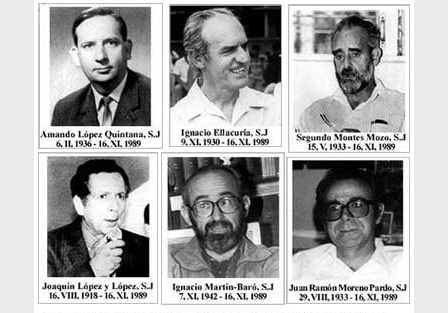The ICJ is shocked by the examining magistrate’s report in the case of the nine soldiers implicated in the assassination in of six Jesuit priests in their residence at the Universidad Centroamericana in November 1989.
The operation was carried out under the command of military officers from the elite “Atlacatl” battalion, directed by Colonel Benavides Commanding the Salvadorian Military Academy. The order given was to eliminate the priests found within the University ‘as intellectual leaders of the guerilla forces’ (cabecillas intelectuales de la guerilla). As the Colonel had made clear that he did not want any witnesses, the Commando also killed the two housekeepers they found on the premises.
The testimony given to the magistrate by eight members of the Commando is explicit about the orders they had been given to dispose of the ‘leading terrorists’ (cabecillas terroristas) and to disguise the murders by a simulated fire-fight. The position of the ninth member of the Commando, Colonel Benavides, was stated by the Chief of Staff of the Armed Forces in an affidavit saying simply that Colonel Benavides was put in charge of a special Commando to reinforce the security provided to the National Intelligence headquarters, the Military Academy, the combined armed forces staffs and the Ministry of Defence and Public Security.
This is compelling evidence supporting the frequent contention that the Armed Forces direct and participate in the repression designed to liquidate anyone who they consider to be a supporter of the opposition.
In view of this it is of the greatest importance that the current bill pending in the National Assembly of EI Salvador, to pardon military personnel accused or convicted of human rights violations, be withdrawn. To exonerate military personnel from past violations would increase the likelihood of continued atrocities. It would be inappropriate even to consider such an amnesty until peace has been established in El Salvador.
Further evidence of the danger of such amnesty provisions is provided by the new regime in Nicaragua. The-Sandinista controlled legislature has just approved a bill that includes forgiveness of unauthorized appropriation of state properties that has been intensified since the recent election.
The idea of an amnesty can have an emotional appeal, but it is the obligation of every state to prosecute and punish crimes committed by its own agents.




